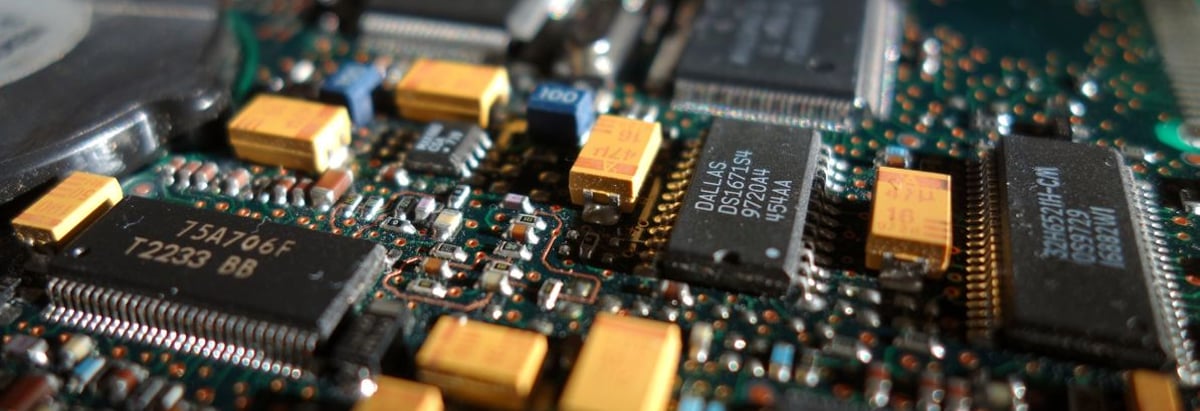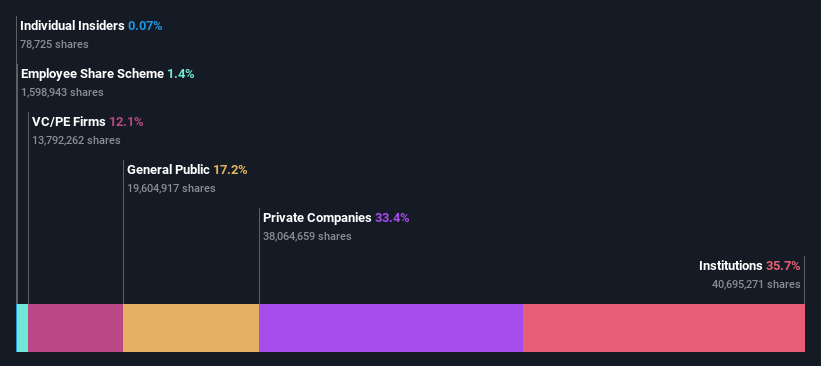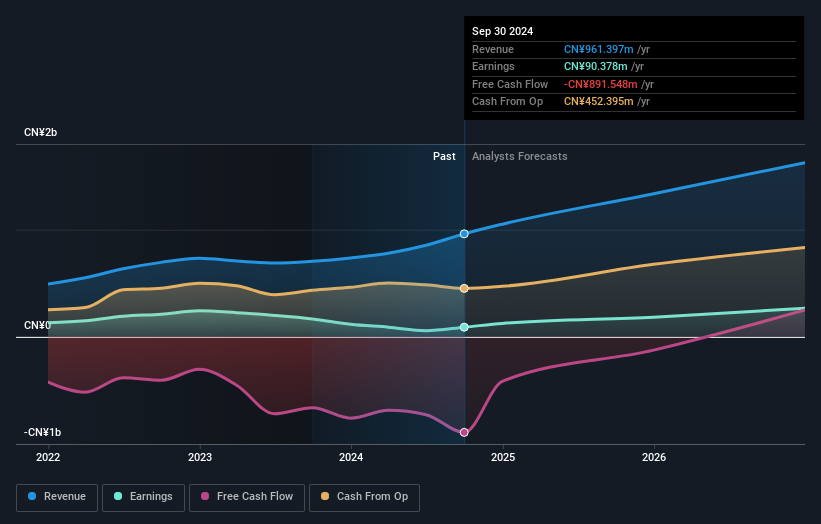- China
- /
- Semiconductors
- /
- SHSE:688372
Great week for Shanghai V-Test Semiconductor Tech. Co., Ltd. (SHSE:688372) institutional investors after losing 25% over the previous year

Key Insights
- Institutions' substantial holdings in Shanghai V-Test Semiconductor Tech implies that they have significant influence over the company's share price
- A total of 5 investors have a majority stake in the company with 53% ownership
- Using data from analyst forecasts alongside ownership research, one can better assess the future performance of a company
If you want to know who really controls Shanghai V-Test Semiconductor Tech. Co., Ltd. (SHSE:688372), then you'll have to look at the makeup of its share registry. With 36% stake, institutions possess the maximum shares in the company. In other words, the group stands to gain the most (or lose the most) from their investment into the company.
Institutional investors would probably welcome last week's 9.5% increase in the share price after a year of 25% losses as a sign that returns may to begin trending higher.
In the chart below, we zoom in on the different ownership groups of Shanghai V-Test Semiconductor Tech.
See our latest analysis for Shanghai V-Test Semiconductor Tech

What Does The Institutional Ownership Tell Us About Shanghai V-Test Semiconductor Tech?
Institutions typically measure themselves against a benchmark when reporting to their own investors, so they often become more enthusiastic about a stock once it's included in a major index. We would expect most companies to have some institutions on the register, especially if they are growing.
As you can see, institutional investors have a fair amount of stake in Shanghai V-Test Semiconductor Tech. This implies the analysts working for those institutions have looked at the stock and they like it. But just like anyone else, they could be wrong. When multiple institutions own a stock, there's always a risk that they are in a 'crowded trade'. When such a trade goes wrong, multiple parties may compete to sell stock fast. This risk is higher in a company without a history of growth. You can see Shanghai V-Test Semiconductor Tech's historic earnings and revenue below, but keep in mind there's always more to the story.

We note that hedge funds don't have a meaningful investment in Shanghai V-Test Semiconductor Tech. Looking at our data, we can see that the largest shareholder is Shanghai Ruice Semiconductor Technology Co., Ltd. with 31% of shares outstanding. The second and third largest shareholders are Suzhou Oriza Holdings Co., Ltd. and Oriza Puhua (Suzhou) Investment Management Co., Ltd., with an equal amount of shares to their name at 6.1%.
On looking further, we found that 53% of the shares are owned by the top 5 shareholders. In other words, these shareholders have a meaningful say in the decisions of the company.
While studying institutional ownership for a company can add value to your research, it is also a good practice to research analyst recommendations to get a deeper understand of a stock's expected performance. There are a reasonable number of analysts covering the stock, so it might be useful to find out their aggregate view on the future.
Insider Ownership Of Shanghai V-Test Semiconductor Tech
The definition of an insider can differ slightly between different countries, but members of the board of directors always count. Company management run the business, but the CEO will answer to the board, even if he or she is a member of it.
I generally consider insider ownership to be a good thing. However, on some occasions it makes it more difficult for other shareholders to hold the board accountable for decisions.
Our data suggests that insiders own under 1% of Shanghai V-Test Semiconductor Tech. Co., Ltd. in their own names. But they may have an indirect interest through a corporate structure that we haven't picked up on. Keep in mind that it's a big company, and the insiders own CN¥5.2m worth of shares. The absolute value might be more important than the proportional share. Arguably, recent buying and selling is just as important to consider. You can click here to see if insiders have been buying or selling.
General Public Ownership
The general public-- including retail investors -- own 17% stake in the company, and hence can't easily be ignored. This size of ownership, while considerable, may not be enough to change company policy if the decision is not in sync with other large shareholders.
Private Equity Ownership
Private equity firms hold a 12% stake in Shanghai V-Test Semiconductor Tech. This suggests they can be influential in key policy decisions. Some might like this, because private equity are sometimes activists who hold management accountable. But other times, private equity is selling out, having taking the company public.
Private Company Ownership
It seems that Private Companies own 33%, of the Shanghai V-Test Semiconductor Tech stock. It's hard to draw any conclusions from this fact alone, so its worth looking into who owns those private companies. Sometimes insiders or other related parties have an interest in shares in a public company through a separate private company.
Next Steps:
While it is well worth considering the different groups that own a company, there are other factors that are even more important. Consider for instance, the ever-present spectre of investment risk. We've identified 4 warning signs with Shanghai V-Test Semiconductor Tech (at least 2 which are concerning) , and understanding them should be part of your investment process.
But ultimately it is the future, not the past, that will determine how well the owners of this business will do. Therefore we think it advisable to take a look at this free report showing whether analysts are predicting a brighter future.
NB: Figures in this article are calculated using data from the last twelve months, which refer to the 12-month period ending on the last date of the month the financial statement is dated. This may not be consistent with full year annual report figures.
New: Manage All Your Stock Portfolios in One Place
We've created the ultimate portfolio companion for stock investors, and it's free.
• Connect an unlimited number of Portfolios and see your total in one currency
• Be alerted to new Warning Signs or Risks via email or mobile
• Track the Fair Value of your stocks
Have feedback on this article? Concerned about the content? Get in touch with us directly. Alternatively, email editorial-team (at) simplywallst.com.
This article by Simply Wall St is general in nature. We provide commentary based on historical data and analyst forecasts only using an unbiased methodology and our articles are not intended to be financial advice. It does not constitute a recommendation to buy or sell any stock, and does not take account of your objectives, or your financial situation. We aim to bring you long-term focused analysis driven by fundamental data. Note that our analysis may not factor in the latest price-sensitive company announcements or qualitative material. Simply Wall St has no position in any stocks mentioned.
About SHSE:688372
Shanghai V-Test Semiconductor Tech
Shanghai V-Test Semiconductor Tech. Co., Ltd.
High growth potential slight.


